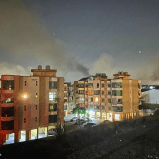NEW YORK/BEIRUT, October 10, 2024 — Israeli attacks in Lebanon have forced health care facilities to close, limiting people’s access to health care at a time when medical and humanitarian needs are rising due to the ongoing conflict, said Doctors Without Borders/Médecins Sans Frontières (MSF). Medical facilities and medical personnel in Lebanon must be protected to ensure people have access to essential health care services.
Heavy Israeli bombardments have severely disrupted access to medical care across Lebanon. As of October 1, six hospitals and 40 general health care centers have closed their doors as the intensity of the fighting has made it impossible to work without safety guarantees, according to OCHA. In the last two weeks, Israeli strikes have claimed the lives of at least 50 paramedics. This brings the total number of health care workers killed since October last year to over 100, as reported by the Lebanese Ministry of Public Health.
“We must ensure the continuation of care for those in need,” said François Zamparini, emergency coordinator for MSF in Lebanon. “We urge all parties to respect international humanitarian law. Civilians, civilian infrastructure, and medical facilities and medical personnel must not be targeted. Their safety must be guaranteed.”
Intense Israeli airstrikes impede MSF response
To reduce devastating consequences for civilians, MSF is working to ensure the continuation of health care in its existing facilities, while also scaling up and adapting activities. However, due to intense Israeli airstrikes, MSF has been forced to suspend some activities in highly affected areas.
“Given the intensity of the violence, road damage, and the lack of guaranteed safety, we are currently unable to reach all affected areas in Lebanon despite the increasing medical and humanitarian needs,” Zamparini said.
Last week, MSF was forced to completely close its clinic in the Palestinian camp of Burj el Barajneh in the southern suburbs of Beirut and temporarily stop activities in Baalbek-Hermel, northeast Lebanon. These are both areas heavily affected by the strikes. The closure of medical facilities has left vulnerable people in these areas, specifically those living with chronic diseases, without the essential services they need.
“We partially reopened our clinic in Hermel this week to ensure that patients receive their medications, providing them with a two-to-three-month stock of essential drugs, depending on the severity of their conditions and medical risks,” Zamparini said. “One of the hospitals we planned to support and had donated medications and trauma kits to, in Nabatiyeh—only a few kilometers away from the active frontlines—was hit on October 5.”

What's happening in Lebanon?
Read moreIn the south of Lebanon, where the conflict and needs are greatest, MSF medical teams remain unable to operate at full capacity due to a lack of safety guarantees for medical personnel. For example, an MSF mobile medical team, which had been actively supporting general health care centers in Nabatiyeh and other areas closer to the Lebanese border since last November, has been forced to stop its activities. The team, which was once able to reach areas near the border, can no longer do so and is currently limited to operating only as far as Saida, which is about 50 kilometers [31 miles] north of the southern border.

A worsening humanitarian crisis in Lebanon
The armed conflict is worsening an ongoing humanitarian crisis. Lebanon’s health care system was already overburdened by the country’s economic crisis, which has caused the immigration of many medical staff and strained the capacity and resources of medical facilities. Local health centers—already at capacity—are now facing increasing pressure as they try to meet the growing medical needs of displaced people.
The scale of displacement in Lebanon significantly surpasses the country’s ability to provide adequate shelter, with over a million people displaced, according to UNHCR. The majority of shelters in which people are seeking safety are in dire condition. In response, MSF has deployed 12 mobile medical teams across various regions of the country, including Beirut, Mount Lebanon, Saida, Tripoli, Bekaa, and Akkar. These teams are providing psychological first aid, general medical consultations, and mental health support, in addition to donating mattresses, hygiene kits, hot meals, and clean water.
MSF first began working in Lebanon in 1976 and has worked in the country without interruption since 2000.




